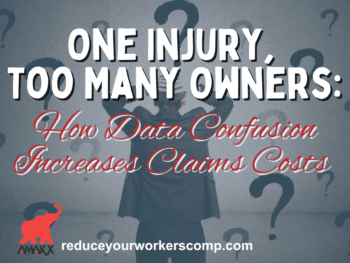Many companies successfully implement workers’ compensation cost containment programs. Here’s a tale of three companies achieved significant cost reductions utilizing various cost reduction tools. The fourth company, below, is making a huge dent in their losses. All four programs are works in progress.
Co #1 A pharmaceutical company reduced its cost by 15% and increased its best practices by 43%. This company started by having all business unit (20) get their WC Management Score on Workers’ Comp Kit. In less than 5 days, all 20 divisions were ranked by score from 0-100, and all gaps had been identified.
Co #2 A theme park with more than 10,000 employees reduced lost days by 20%.
Co #4 A high-profile concession vendor had 40% loss reduction.
Each company is very different, with its own set of obstacles. The pharmacy company has 200 smaller locations; the theme park has two huge locations. The employee populations are diverse and vary from part-time adult workers, high school students, non-English speaking persons, retirees, and even homeless employees.
They are insured, with major carriers. Yet, the carriers did not tell them how to reduce their losses. They didn’t tell them because …. well, because they didn’t ask. Why didn’t they ask? They didn’t ask becuase they didn’t know what to ask for. A circular situation where finally that a broker got me involved and I guided them on the cost reduction path.
In one case studies, the carrier employed work-injury coordinators, called WICs, to help employers develop return-to-work programs and conduct training, but the company never worked with the WICs and never asked for WICs because they didn’t know what a WIC was.
STARTING
These three employers achieved significant cost reduction by STARTING. That’s right – they did not have the perfect solution, the perfect team, perfect RMIS system, but they worked with what they had and started.
Think of it this way. If there are 5 stop lights on Main Street in your town and you are at the first light, do you wait until all the lights are green at each stop light to start driving down Main Street? No. It works real well if you drive through town one stop light at a time.
Co. #4 One company, employing 50,000 people at 500 stores has about 2,600 workers’ compensation accidents annually. With 2,000 open claims at year end, their cost was $100 million. This company used Workers Comp Kit to customize materials because they didn’t have the time or staff to develop the materials internally, so they used Workers’ Comp Kit as a base — a very good decision. And, their TPA paid for the service to supplement their already good service. THAT’s great customer service.
Employing an independent claim program audit (TPA vs. Self- Administration Model), it was recommended they use a third-party administrator. The chose a dedicated claims unit which allowed the company to reap these benefits:
- Low turnover of an experienced claims staff.
- The claims staff handled their account exclusively.
- The onsite nurses triage reviewed workers’ comp claims daily.
- Custom service standards were monitored.
- Risk management remained onsite, improving communication.
- TPA claims staff said they felt as if they worked for the company.
Every employer has a choice – save money and muddle along with injured workers out “forever,” or spend a little more to control the high work comp claims by hiring the most effective TPA available — it’s all about “cost effectiveness,” not “cost.”
Choose wisely.
Author Rebecca Shafer, J.D., Consultant, President, Amaxx Risks Solutions, Inc. has worked successfully for 20 years with many industries to reduce Workers’ Compensation costs, including airlines, healthcare, manufacturing, printing/publishing, pharmaceuticals, retail, hospitality and manufacturing.
Do not use this information without independent verification. All state laws vary. You should consult with your insurance broker or agent about workers’ comp issues.
©2010 Amaxx Risk Solutions, Inc. All rights reserved under International Copyright Law. If you would like permission to reprint this material, contact Info@WorkersCompKit.com



























